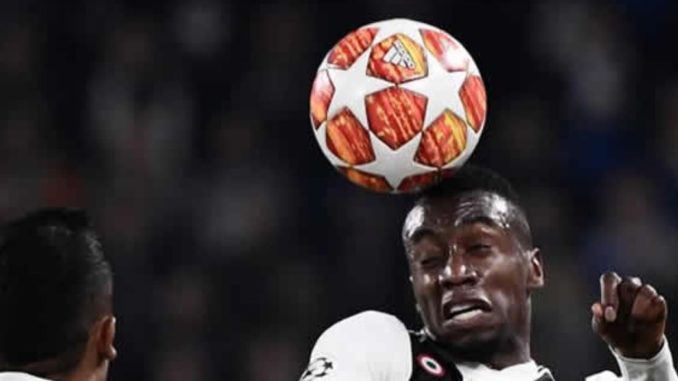
FOOTBALL, often described as the “beautiful game,” is fast losing its allure to racism. From Italy to the United Kingdom, Montenegro to Serbia and Germany to France, football is under siege from a new wave of discrimination, anti-Semitism, homophobia and racial abuse being perpetrated by fanatical fans. In the past six months, black players in the top leagues in Europe have suffered savage racist abuse at matches for club and country. To save the ugly trend from permanently damaging its integrity, football authorities need to move fast by imposing the severest sanctions on those bringing the world’s most popular sport into disrepute.
Although it was subdued for a long time, racism has never been totally exorcised from football. These days, the bigoted ideology of far right-wingers, ultras and neo-Nazis in Europe has deeply infiltrated football, with serious consequences for non-Caucasian players. In Britain, the turning point was the Brexit referendum, in which the UK voted in 2016 to leave the European Union. At that juncture, nationalism and politics mixed potently with football.
Sadly, the response by the political leaders and football authorities has been pathetic. Blacks and Muslims have come under immense racist attacks. In one major incident, Danny Rose, who plays for Tottenham and the England national team, is even ready to forego all the glamour and the hefty weekly pay cheque of £60,000 (N24.15 million) he receives from his club because of the serial abuse he has suffered. He stated, “… I can’t wait to turn my back on football.” Coincidentally, Rose was one of the black England players who suffered vile racist abuse because of their colour last March in Montenegro in a 2020 European Championship qualifier. Rose, while playing for the England U-21 team in Serbia in 2012, had also been racially abused. There is nothing more agonising. It has forced many aspiring young black players out of the sport. Football is the loser for it.
Shortly after Manchester United lost 3-0 to Barcelona in Spain on Tuesday in the UEFA Champions League, Ashley Young, the captain of the English team, was subjected to scathing racist attacks on Twitter, which responded by suspending the offensive accounts. Other high profile racist incidents in England involved Raheem Sterling of Manchester City, Pierre-Emerick Aubameyang of Arsenal, Mohammed Salah of Liverpool and Callum Hudson-Odoi of Chelsea. In Aubameyang’s case, he had a banana skin thrown at him in a north London derby featuring Arsenal versus Tottenham in December. In an online video posted by Chelsea supporters, Salah was called a “bomber.” This is disheartening.
Two weeks ago, three Watford players — Troy Deeney, Christian Kabasele and Adrian Mariappa — deleted their Instagram accounts after they and their family members were subjected to abuse and threatened with death on social media. A 2019 report by anti-racism England-based charity, Kick It Out, stated that discrimination in professional and amateur football matches rose from 469 cases in 2016-17 to 520 in 2017-18.
Primarily, it is being fuelled by organised groups like the Chelsea Headhunters and Combat 18 in England, who post images on social media displaying Nazi symbols of death. In Italy, one of those groups is named “Blood and Honour.” In football matches, they are seen wearing tattoos and chanting intimidating rhetoric against opponents and black players. Alberto Testa, a professor of criminology at the University of West London, says these are “highly organised groups, composed of 40-50 people. The violence is carefully planned, hence it’s much more difficult to prevent.”
This noxious spectre hangs dangerously over Germany, Italy and France. In Italy, Kalidou Koulibaly suffered needlessly last December during a match following “monkey” chants directed at him. His team suffered because of his action as Napoli lost the match to Inter Milan. He suffered the same fate last week in London during the Arsenal versus Napoli Europa League match. This is not right. Mezut Ozil, an Arsenal player, abruptly quit playing for Germany early this year citing “racism” and “right-wing propaganda.” Ozil, of Turkish origin, won the World Cup with Germany in 2014 in Brazil.
In an age of digitalisation, football racism has crossed the red line, particularly in Europe, which prides itself on having an advanced civilisation. Unfortunately, all the sanctions by clubs have somehow proved fruitless, including making the affected clubs playing their matches behind closed doors and fining them. This, therefore, reveals the depth of the conundrum. Consequently, some players and coaches have called on players subjected to racist abuse to walk off during matches. In itself, this is a delicate option: walking away might just be playing into the hands of the bigots, for this is what they want: to see the back of such players.
Ordinarily, football, because of its mass appeal, ought to be an inclusive sport. A few misguided bigots and political right-wingers should not render it exclusive. Authorities at the club level and national football associations, where intolerance is growing, have to devise new measures against this hydra-headed monster, otherwise, it lays the future of the sport in ruins. The groups involved should be identified and their members and sponsors banned from football matches. More than life bans, individuals who trade in racism should also be prosecuted for hate crimes and sundry offences. Clubs that fail to tame the monster should be heavily fined.
END

Be the first to comment